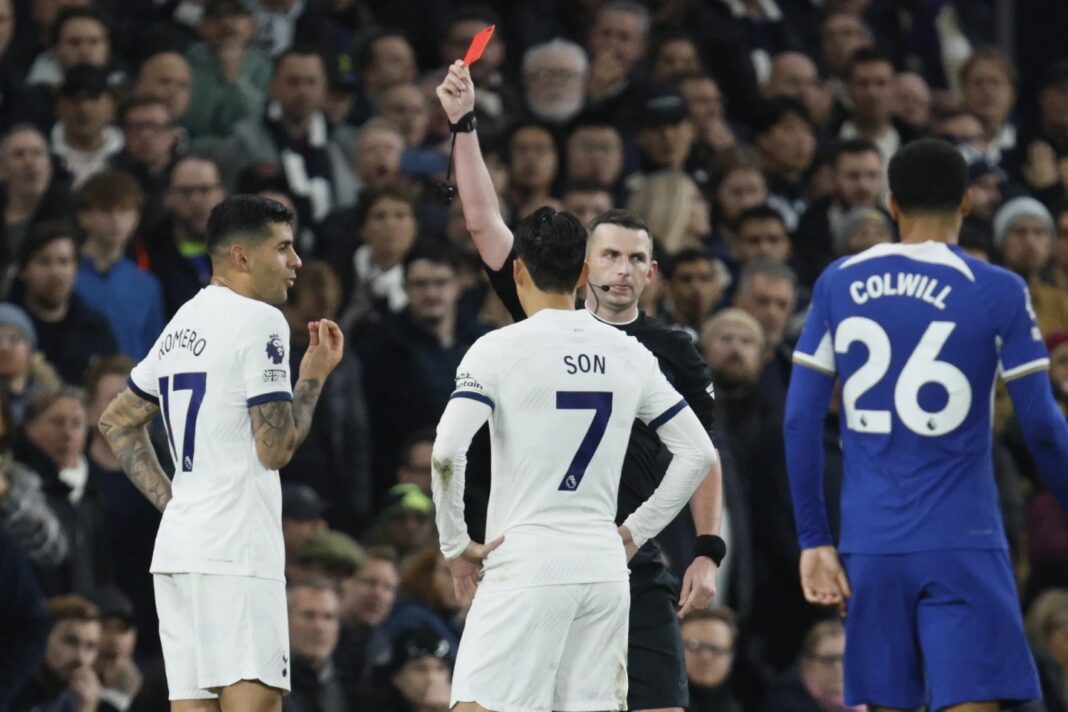BY GRAHAM DUNBAR
Video reviews in soccer were meant to take no more than six seconds. Now they can last close to six minutes.
It was expected to happen once every four or five games. Now it can be four or five times in just one game.
Reviewing refereeing decisions has come a long – and increasingly unloved – way from the VAR (video assistant referee) project first trialed by FIFA in 2016.
On Monday, a chaotic 4-1 loss for Tottenham against Chelsea fueled fears the English Premier League has got lost applying the high-tech aid to help referees make right calls.
Two days earlier, Arsenal coach Mikel Arteta lashed out at “an absolute disgrace” to allow Newcastle a decisive goal after a triple-layered VAR review.
It is likely true Premier League match officials and the protocol they use are the biggest problem, not the VAR system overall which won praise at the last two men’s World Cups.
Still, it is clear that today’s VAR is far away from the targets anticipated by FIFA officials overseeing trials in 2016 to ensure it would be ready for the World Cup in Russia two years later.
In Zurich seven years ago, FIFA’s director of refereeing Massimo Busacca said it should “not take more than five, six seconds” to review an incident.
“If we need one (camera) angle more, of course it can take two seconds more,” Busacca told The Associated Press then.
There were 21 total minutes of stoppage time added on Monday at Tottenham in an intense game of five disallowed goals, two red cards for the home team and a slew of video reviews plus injured players.
“I don’t like it,” Tottenham coach Ange Postecoglou said after his team’s unbeaten league run ended. “I don’t like the standing around, the whole theater around waiting for decisions. But I know I’m in the wilderness on that.”
Those pauses in play were at least shorter than the five minutes-plus that was needed to inspect an 88th-minute Burnley “goal” against Bournemouth two weeks ago and confirm it was offside.
“This is embarrassing,” came the chant by fans as the game at Bournemouth was frozen.
It is not just in the Premier League. European Championship qualifying games use the continent’s best match officials and yet it took 4 minutes, 20 seconds to confirm Spain’s goal was not offside in a 1-0 win at Norway last month.
In 2016, top referee Bjorn Kuipers suggested if VAR checks take more than 12 seconds “it’s not good for the game.”
The fundamental goal of VAR has not changed – verify potential game-changing incidents in awarding goals, penalty kicks and red cards, plus cases of mistaken identity in showing cards.
There had been wide agreement that soccer should use available technology to avoid rare but notorious incidents like Thierry Henry’s handball in the build-up to a goal that helped send France instead of Ireland to the 2010 World Cup.
“If you have a top referee,” Busacca, who refereed at two World Cups and the 2009 Champions League final, predicted in 2016 “one situation every four or five games.”
Tottenham-Chelsea showed it is possible to have four or five reviews in a game with the stress now on micro-managing all incidents rather than simply avoiding “clear and obvious errors.”
“People are going to forensically scrutinize everything to make sure they’re comfortable it’s right, and even at the end of that, we’re still not happy,” said Postecoglou. His team benefited this season from a Liverpool goal being wrongly ruled out for offside due to miscommunication between the referee and video officials at a central base away from the stadium.
“Significant human error,” the league officials’ group acknowledged after Tottenham’s 2-1 win that is still title-chasing Liverpool’s only loss in the league.
Former Australia coach Postecoglou said he is traditional and prefers soccer without VAR, where all accept occasional mistakes and respect the referee.
Busacca foresaw this problem in 2016, insisting technology must not undermine the referee who had to be seen to make the final decision.
“Never lose the authority of referees, never take it out,” the Swiss FIFA official had cautioned.
It might be too late, unless VAR is reviewed at the annual meeting of world soccer’s law-making panel, known by the acronym IFAB.
“You can’t tell me referees are in control of games,” Postecoglou said Monday. “They’re not. Control is outside of that, but that’s where the game’s going.”
AP



